Edie Melson's Blog, page 336
July 29, 2016
30 Days of Idea Starters for Writers - Calendar Days - August's Crazy Holidays & Special Occasions
by Edie Melson @EdieMelson
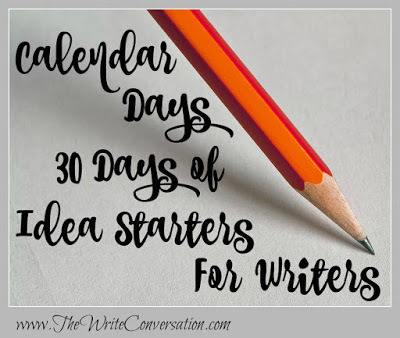 It’s time again for Calendar Days.
It’s time again for Calendar Days.
These are fun to read and also a great way to jumpstart our creativity when looking for ideas for articles and blog posts. They’re also a fun writing prompt idea.
In addition, calendar days are great conversation starters for social media sites like Facebook and Twitter.August is:Romance Awareness MonthHappiness Happens MonthPeach MonthWater Quality MonthFamily Fun MonthNational Eye Exam MonthNational Catfish MonthAdmit You’re Happy MonthNational Picnic MonthAmerican Artists Appreciation MonthWhat Will Be Your Legacy MonthNational Golf Month
Weekly CelebrationsWeek 1:National Simplify your Life WeekNational Cleanse Your Skin Week
Week 2:National Smile Week
Week 3:Friendship week
Week 4:Be Kind to Humankind Week
Individual DaysAugust 1National Raspberry Cream Pie DayRespect for Parents DayWorld Lung DayRounds Resounding DayNationalGirlfriends DayWorld Wide Web DayAir Force DayYorkshire Day
August 2National Ice Cream Sandwich DayNational Coloring Book DayNational Night Out
August 3Clean Your Floors DayNational Grab Some Nuts DayNational Watermelon Day
August 4Assistance Dog DayNational Chocolate Chip Cookie DayU.S. Coast Guard Day
August 5Work Like a Dog DayNational Oyster DayNational Underwear Day
August 6National Wiggle Your Toes DayNational Disc Golf DayNational Mustard DaySandcastle DayNational Root Beer Float DayNational Fresh Breath Day
August 7Purple Heart DayNational Lighthouse DayInternational Forgiveness DayAmerican Family DayNational Friendship DayNational Raspberries N’ Cream DayNational Sisters DayDoll DayParticularly Preposterous Packaging DayProfessional Speakers Day
August 8National Frozen Custard DayNational Dollar DayNational Sneak Some Zucchini onto Your Neighbor’s Porch DayNational Happiness Happens DayInternational Cat DayOdie Day (Garfield’s Pal)
August 9National Veep DayNational Rice Pudding DayNational Book Lover’s Day
August 10National Lazy DayWorld Lion DayNational Duran Duran DaySkyscraper Appreciation DayNational S’mores Day
August 11National Sons and Daughter DayIngersoll DayPlay in the Sand DayNational Presidential Joke Day (did you hear the one about…)
August 12National Julienne Fries DayNational Vinyl Record DayNational Middle Child DayInternational Youth Day
August 13International Left Hander’s DayNational Bowling DayNational Filet Mignon DayNational Garage Sale Day
August 14V-J Day (marks the end of WWII. There are actually 3 dates with this designation. August 14—Japan surrenders; August 15‑Surrender announced to the world; September 2‑Ceremony and formal signing of surrender.)National Creamsicle DaySocial Security DayNational Navajo Code Talkers Day
August 15Best Friend’s DayNational Lemon Meringue Pie DayNational V-J Day (see note above)National Relaxation Day
August 16National Rollercoaster DayWave at the Surveillance Cameras DayNational Tell a Joke DayNational Airborne Day
August 17National Thriftshop DayNational I LOVE My Feet DayBlack Cat appreciation Day
August 18Bad Poetry DayNational Ice Cream Pie DayNational Mail Order Catalog Day
August 19Photography DayNational Soft Ice Cream DayWorld Humanitarian DayNational Aviation Day
August 20World Mosquito DayInternational Geocaching Day (Third Saturday in August)International Homeless Animals DayWorld Honey Bee DayNational Chocolate Pecan Pie DayNational Radio Day
August 21National Spumoni DayNational Senior Citizen’s DayPoets Day
August 22Be an Angel DayNational Tooth Fairy Day (also celebrated on February 28)Take Your Cat to the Vet Day
August 23Valentino DayNational Sponge Cake DayNational Ride the Wind Day
August 24Knife DayNational Waffle DayNational Peach Pie DayVesuvius DayInternational Strange Music DayPluto Demoted Day
August 25National Secondhand Wardrobe DayNational Banana Split DayNational Kiss and Make Up Day
August 26National Women’s Equality DayNational Cherry Popsicle DayNational WebMistress DayNational Dog Day
August 27Global Forgiveness DayNational Just Because DayFranchise Appreciation DayBurger DayThe Duchess Who Wasn’t Day (Margaret Wolfe Hungerford http://en.wikipedia.org/wiki/Margaret_Wolfe_Hungerford, she’s responsible for the popular phrase, “Beauty is in the eye of the beholder.” It’s from her book, Molly Bawn) Just Because Day
August 28Bow Tie DayNational Cherry Turnovers DayPony Express DayRadio commercials DayRace Your Mouse Around the Icons Day
August 29More Herbs, Less Salt DayMarine Corps Reserve BirthdayIndividual Rights DayNational Chop Suey Day
August 30National Toasted Marshmallow DayInternational Whale Shark DaySlinky DayNational Holistic Pet DayFrankenstein Day
August 31Love Litigating Lawyers DayNational Matchmaker DayWe Love Memoirs DayNational Trail Mix Day
Now let's do a little brainstorming for next month. What are some of your favorite days from the list and how do you propose using them?
Don't forget to join the conversation!Blessings,Edie
TWEETABLESUse August's crazy holidays to get the #socialmedia conversation started & spark #writing ideas (Click to Tweet)
Don't get caught without an idea, use the calendar to #write #blog posts & articles - @EdieMelson (Click to Tweet)
 It’s time again for Calendar Days.
It’s time again for Calendar Days. These are fun to read and also a great way to jumpstart our creativity when looking for ideas for articles and blog posts. They’re also a fun writing prompt idea.
In addition, calendar days are great conversation starters for social media sites like Facebook and Twitter.August is:Romance Awareness MonthHappiness Happens MonthPeach MonthWater Quality MonthFamily Fun MonthNational Eye Exam MonthNational Catfish MonthAdmit You’re Happy MonthNational Picnic MonthAmerican Artists Appreciation MonthWhat Will Be Your Legacy MonthNational Golf Month
Weekly CelebrationsWeek 1:National Simplify your Life WeekNational Cleanse Your Skin Week
Week 2:National Smile Week
Week 3:Friendship week
Week 4:Be Kind to Humankind Week
Individual DaysAugust 1National Raspberry Cream Pie DayRespect for Parents DayWorld Lung DayRounds Resounding DayNationalGirlfriends DayWorld Wide Web DayAir Force DayYorkshire Day
August 2National Ice Cream Sandwich DayNational Coloring Book DayNational Night Out
August 3Clean Your Floors DayNational Grab Some Nuts DayNational Watermelon Day
August 4Assistance Dog DayNational Chocolate Chip Cookie DayU.S. Coast Guard Day
August 5Work Like a Dog DayNational Oyster DayNational Underwear Day
August 6National Wiggle Your Toes DayNational Disc Golf DayNational Mustard DaySandcastle DayNational Root Beer Float DayNational Fresh Breath Day
August 7Purple Heart DayNational Lighthouse DayInternational Forgiveness DayAmerican Family DayNational Friendship DayNational Raspberries N’ Cream DayNational Sisters DayDoll DayParticularly Preposterous Packaging DayProfessional Speakers Day
August 8National Frozen Custard DayNational Dollar DayNational Sneak Some Zucchini onto Your Neighbor’s Porch DayNational Happiness Happens DayInternational Cat DayOdie Day (Garfield’s Pal)
August 9National Veep DayNational Rice Pudding DayNational Book Lover’s Day
August 10National Lazy DayWorld Lion DayNational Duran Duran DaySkyscraper Appreciation DayNational S’mores Day
August 11National Sons and Daughter DayIngersoll DayPlay in the Sand DayNational Presidential Joke Day (did you hear the one about…)
August 12National Julienne Fries DayNational Vinyl Record DayNational Middle Child DayInternational Youth Day
August 13International Left Hander’s DayNational Bowling DayNational Filet Mignon DayNational Garage Sale Day
August 14V-J Day (marks the end of WWII. There are actually 3 dates with this designation. August 14—Japan surrenders; August 15‑Surrender announced to the world; September 2‑Ceremony and formal signing of surrender.)National Creamsicle DaySocial Security DayNational Navajo Code Talkers Day
August 15Best Friend’s DayNational Lemon Meringue Pie DayNational V-J Day (see note above)National Relaxation Day
August 16National Rollercoaster DayWave at the Surveillance Cameras DayNational Tell a Joke DayNational Airborne Day
August 17National Thriftshop DayNational I LOVE My Feet DayBlack Cat appreciation Day
August 18Bad Poetry DayNational Ice Cream Pie DayNational Mail Order Catalog Day
August 19Photography DayNational Soft Ice Cream DayWorld Humanitarian DayNational Aviation Day
August 20World Mosquito DayInternational Geocaching Day (Third Saturday in August)International Homeless Animals DayWorld Honey Bee DayNational Chocolate Pecan Pie DayNational Radio Day
August 21National Spumoni DayNational Senior Citizen’s DayPoets Day
August 22Be an Angel DayNational Tooth Fairy Day (also celebrated on February 28)Take Your Cat to the Vet Day
August 23Valentino DayNational Sponge Cake DayNational Ride the Wind Day
August 24Knife DayNational Waffle DayNational Peach Pie DayVesuvius DayInternational Strange Music DayPluto Demoted Day
August 25National Secondhand Wardrobe DayNational Banana Split DayNational Kiss and Make Up Day
August 26National Women’s Equality DayNational Cherry Popsicle DayNational WebMistress DayNational Dog Day
August 27Global Forgiveness DayNational Just Because DayFranchise Appreciation DayBurger DayThe Duchess Who Wasn’t Day (Margaret Wolfe Hungerford http://en.wikipedia.org/wiki/Margaret_Wolfe_Hungerford, she’s responsible for the popular phrase, “Beauty is in the eye of the beholder.” It’s from her book, Molly Bawn) Just Because Day
August 28Bow Tie DayNational Cherry Turnovers DayPony Express DayRadio commercials DayRace Your Mouse Around the Icons Day
August 29More Herbs, Less Salt DayMarine Corps Reserve BirthdayIndividual Rights DayNational Chop Suey Day
August 30National Toasted Marshmallow DayInternational Whale Shark DaySlinky DayNational Holistic Pet DayFrankenstein Day
August 31Love Litigating Lawyers DayNational Matchmaker DayWe Love Memoirs DayNational Trail Mix Day
Now let's do a little brainstorming for next month. What are some of your favorite days from the list and how do you propose using them?
Don't forget to join the conversation!Blessings,Edie
TWEETABLESUse August's crazy holidays to get the #socialmedia conversation started & spark #writing ideas (Click to Tweet)
Don't get caught without an idea, use the calendar to #write #blog posts & articles - @EdieMelson (Click to Tweet)
Published on July 29, 2016 01:00
July 28, 2016
Patience Now for Writers & Dreamers
by Henry McLaughlin @RiverBendSagas
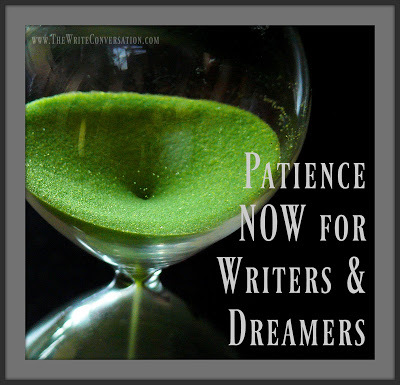 There is a scene in Star Wars, Episode IV, where Luke is attacking the Death Star, about to drop a bomb down a chute to the core of the weapon. His wing commander tells him, “Wait for it. Wait for it.
There is a scene in Star Wars, Episode IV, where Luke is attacking the Death Star, about to drop a bomb down a chute to the core of the weapon. His wing commander tells him, “Wait for it. Wait for it.
Did you know the Lord tells us basically the same thing? In Habakkuk 2:2 – 3 (NLT) the prophet writes:
Then the Lord said to me, “Write my answer plainly on tablets, so that a runner can carry the correct message to others. This vision is for a future time. It describes the end, and it will be fulfilled. If it seems slow in coming, wait patiently, for it will surely take place. It will not be delayed.
How many of us have ever prayed along the lines of: Lord, fill me with Your patience. NOW? I think we all have in one form or another. We have a dream, a desire, a goal and it feels like it’s never going to happen.
I discovered this verse nearly twenty years ago when I was believing for a job with a large ministry. And believing. And believing. And believing. I had made sure to write my goals based on the call God placed on my life at that season. Submitted applications but the call for an interview seemed like it would never come. The Lord did open the door for me—just not the one I had planned—and I worked for the ministry for ten years.
 God has a call for each of us, an ultimate plan.I do believe God has a call for each of us, an ultimate plan He wants us to live out. But He can’t always simply thrust us into that dream. We need to grow into it, we need to be prepared for promotion, for the work we will have to do to achieve all He wants us to accomplish. When I look back over my life, I see how each place I had in ministry, each job I had in the world, prepared me for the next step in God’s plan.
God has a call for each of us, an ultimate plan.I do believe God has a call for each of us, an ultimate plan He wants us to live out. But He can’t always simply thrust us into that dream. We need to grow into it, we need to be prepared for promotion, for the work we will have to do to achieve all He wants us to accomplish. When I look back over my life, I see how each place I had in ministry, each job I had in the world, prepared me for the next step in God’s plan.
Now I can see how each position and place prepared me to write the words he gives me, words to minister hope, reconciliation, redemption, and restoration.
And I can see how He tried to develop patience in me. I didn’t always cooperate with Him. Sometimes, I still don’t. To be patient—to wait for it—is really a test of faith. Do I trust Him enough to do what He tells me, which is write, and trust He will find the best way to get my words to the readers? Patience really asks—Do I trust His timing?
God is never late. He’s never early either. He’s always right on time. But His time is not always my time.
Do I trust Him enough to believe his promise “…it will surely take place. It will not be delayed…”?
How do you handle those times when it seems like your dream will never arrive?
TWEETABLESGod is always right on time...But His time isn't always my time - @RiverBendSagas (Click to Tweet)
Patience NOW for Writers & Dreamers - Henry McLaughlin, @RiverBendSagas (Click to Tweet)
 Henry’s debut novel, Journey to Riverbend, won the 2009 Operation First Novel contest.
Henry’s debut novel, Journey to Riverbend, won the 2009 Operation First Novel contest.
He serves as Associate Director of North Texas Christian Writers.
Henry edits novels, leads critique groups, and teaches at conferences and workshops. He enjoys mentoring and coaching individual writers.
Connect with Henry on his blog, Twitter and Facebook.
 There is a scene in Star Wars, Episode IV, where Luke is attacking the Death Star, about to drop a bomb down a chute to the core of the weapon. His wing commander tells him, “Wait for it. Wait for it.
There is a scene in Star Wars, Episode IV, where Luke is attacking the Death Star, about to drop a bomb down a chute to the core of the weapon. His wing commander tells him, “Wait for it. Wait for it.Did you know the Lord tells us basically the same thing? In Habakkuk 2:2 – 3 (NLT) the prophet writes:
Then the Lord said to me, “Write my answer plainly on tablets, so that a runner can carry the correct message to others. This vision is for a future time. It describes the end, and it will be fulfilled. If it seems slow in coming, wait patiently, for it will surely take place. It will not be delayed.
How many of us have ever prayed along the lines of: Lord, fill me with Your patience. NOW? I think we all have in one form or another. We have a dream, a desire, a goal and it feels like it’s never going to happen.
I discovered this verse nearly twenty years ago when I was believing for a job with a large ministry. And believing. And believing. And believing. I had made sure to write my goals based on the call God placed on my life at that season. Submitted applications but the call for an interview seemed like it would never come. The Lord did open the door for me—just not the one I had planned—and I worked for the ministry for ten years.
 God has a call for each of us, an ultimate plan.I do believe God has a call for each of us, an ultimate plan He wants us to live out. But He can’t always simply thrust us into that dream. We need to grow into it, we need to be prepared for promotion, for the work we will have to do to achieve all He wants us to accomplish. When I look back over my life, I see how each place I had in ministry, each job I had in the world, prepared me for the next step in God’s plan.
God has a call for each of us, an ultimate plan.I do believe God has a call for each of us, an ultimate plan He wants us to live out. But He can’t always simply thrust us into that dream. We need to grow into it, we need to be prepared for promotion, for the work we will have to do to achieve all He wants us to accomplish. When I look back over my life, I see how each place I had in ministry, each job I had in the world, prepared me for the next step in God’s plan.Now I can see how each position and place prepared me to write the words he gives me, words to minister hope, reconciliation, redemption, and restoration.
And I can see how He tried to develop patience in me. I didn’t always cooperate with Him. Sometimes, I still don’t. To be patient—to wait for it—is really a test of faith. Do I trust Him enough to do what He tells me, which is write, and trust He will find the best way to get my words to the readers? Patience really asks—Do I trust His timing?
God is never late. He’s never early either. He’s always right on time. But His time is not always my time.
Do I trust Him enough to believe his promise “…it will surely take place. It will not be delayed…”?
How do you handle those times when it seems like your dream will never arrive?
TWEETABLESGod is always right on time...But His time isn't always my time - @RiverBendSagas (Click to Tweet)
Patience NOW for Writers & Dreamers - Henry McLaughlin, @RiverBendSagas (Click to Tweet)
 Henry’s debut novel, Journey to Riverbend, won the 2009 Operation First Novel contest.
Henry’s debut novel, Journey to Riverbend, won the 2009 Operation First Novel contest. He serves as Associate Director of North Texas Christian Writers.
Henry edits novels, leads critique groups, and teaches at conferences and workshops. He enjoys mentoring and coaching individual writers.
Connect with Henry on his blog, Twitter and Facebook.
Published on July 28, 2016 01:00
July 27, 2016
Excellence Today Will Ensure Writing Success Tomorrow
by DiAnn Mills @DiAnnMills
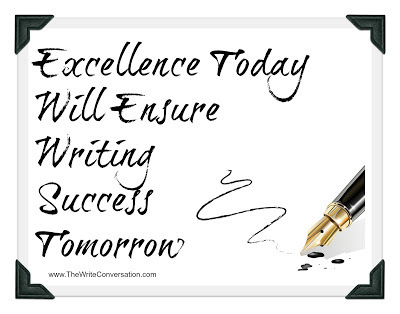 Professional writers achieve success by initiating effective practices that increase their skills and self-confidence. The moment they accept the writing challenge, they develop a plan of action by studying how others have attained their goals.
Professional writers achieve success by initiating effective practices that increase their skills and self-confidence. The moment they accept the writing challenge, they develop a plan of action by studying how others have attained their goals.
Writing and thriving with sellable manuscripts require a tremendous amount of work. Each writer is different in his approach and method, but by following the steps of established bestsellers, we can make a name for ourselves in the world of publishing.The steps aren’t difficult, and consistency is the key. When we incorporate the following 9 items into our daily routines, we will see our dreams on the written page.
Now is the time to begin.Look into the mirror and repeat this confirmation, “I am a skillful writer.”Write. Do not make excuses. Write. Make the time to do the work.Read in the genre you want to write.Read the bestsellers and analyze the writers’ techniques.Study the how-to books.Understand writer guidelines are an aid to learning the craft.Research the market and submit regularly.Take time to understand and practice social media. Establish a brand.Whatever you learn, be willing to share with a serious writer.
What about you? Are you ready to roll up your sleeves and begin the program for excellence now? What of the 9 items listed above will you incorporate into your writing life?
TWEETABLESExcellence Today willEnsure #Writing Success tomorrow - @DiAnnMills (Click to Tweet)
Today's compromise on #writing quality is tomorrow's career plunge - @DiAnnMills (Click to Tweet)
 DiAnn Mills is a bestselling author who believes her readers should expect an adventure. She combines unforgettable characters with unpredictable plots to create action-packed, suspense-filled novels.
DiAnn Mills is a bestselling author who believes her readers should expect an adventure. She combines unforgettable characters with unpredictable plots to create action-packed, suspense-filled novels.
Her titles have appeared on the CBA and ECPA bestseller lists; won two Christy Awards; and been finalists for the RITA, Daphne Du Maurier, Inspirational Readers’ Choice, and Carol award contests. Library Journal presented her with a Best Books 2014: Genre Fiction award in the Christian Fiction category for Firewall.
DiAnn is a founding board member of the American Christian Fiction Writers; a member of Advanced Writers and Speakers Association; International Thriller Writers, and the Faith, Hope, and Love chapter of Romance Writers of America. She is co-director of The Author Roadmap with social media specialist Edie Melson where she continues her passion of helping other writers be successful. She speaks to various groups and teaches writing workshops around the country.
DiAnn has been termed a coffee snob and roasts her own coffee beans. She’s an avid reader, loves to cook, and believes her grandchildren are the smartest kids in the universe. She and her husband live in sunny Houston, Texas.
DiAnn is very active online and would love to connect with readers on any of the social media platforms listed at www.diannmills.com.
 Professional writers achieve success by initiating effective practices that increase their skills and self-confidence. The moment they accept the writing challenge, they develop a plan of action by studying how others have attained their goals.
Professional writers achieve success by initiating effective practices that increase their skills and self-confidence. The moment they accept the writing challenge, they develop a plan of action by studying how others have attained their goals.Writing and thriving with sellable manuscripts require a tremendous amount of work. Each writer is different in his approach and method, but by following the steps of established bestsellers, we can make a name for ourselves in the world of publishing.The steps aren’t difficult, and consistency is the key. When we incorporate the following 9 items into our daily routines, we will see our dreams on the written page.
Now is the time to begin.Look into the mirror and repeat this confirmation, “I am a skillful writer.”Write. Do not make excuses. Write. Make the time to do the work.Read in the genre you want to write.Read the bestsellers and analyze the writers’ techniques.Study the how-to books.Understand writer guidelines are an aid to learning the craft.Research the market and submit regularly.Take time to understand and practice social media. Establish a brand.Whatever you learn, be willing to share with a serious writer.
What about you? Are you ready to roll up your sleeves and begin the program for excellence now? What of the 9 items listed above will you incorporate into your writing life?
TWEETABLESExcellence Today willEnsure #Writing Success tomorrow - @DiAnnMills (Click to Tweet)
Today's compromise on #writing quality is tomorrow's career plunge - @DiAnnMills (Click to Tweet)
 DiAnn Mills is a bestselling author who believes her readers should expect an adventure. She combines unforgettable characters with unpredictable plots to create action-packed, suspense-filled novels.
DiAnn Mills is a bestselling author who believes her readers should expect an adventure. She combines unforgettable characters with unpredictable plots to create action-packed, suspense-filled novels.
Her titles have appeared on the CBA and ECPA bestseller lists; won two Christy Awards; and been finalists for the RITA, Daphne Du Maurier, Inspirational Readers’ Choice, and Carol award contests. Library Journal presented her with a Best Books 2014: Genre Fiction award in the Christian Fiction category for Firewall.
DiAnn is a founding board member of the American Christian Fiction Writers; a member of Advanced Writers and Speakers Association; International Thriller Writers, and the Faith, Hope, and Love chapter of Romance Writers of America. She is co-director of The Author Roadmap with social media specialist Edie Melson where she continues her passion of helping other writers be successful. She speaks to various groups and teaches writing workshops around the country.
DiAnn has been termed a coffee snob and roasts her own coffee beans. She’s an avid reader, loves to cook, and believes her grandchildren are the smartest kids in the universe. She and her husband live in sunny Houston, Texas.
DiAnn is very active online and would love to connect with readers on any of the social media platforms listed at www.diannmills.com.
Published on July 27, 2016 01:00
July 26, 2016
Fact From Fiction—Is There a Difference?
by Eva Marie Everson @EvaMarieEverson
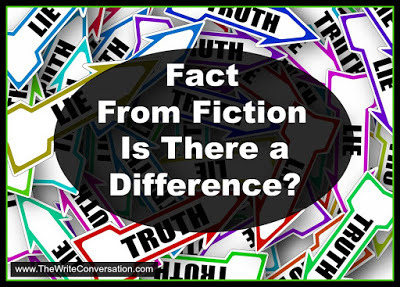 In the past few years I’ve found myself in a strange predicament. For a fiction writer, I’ve been telling a lot of truths. This realization began years ago when I heard the story of Joan Hunt Zimmerman. My friend, Sharon Decker, who happened to also be a friend of Mrs. Zimmerman told me about her. “What do you think,” she said, “of a woman who comes from England to American after World War II, moves in with four strangers, and ends up buying a wedding dress with them?”I admit it. I was intrigued. So much so that I stayed quiet about it, telling only my agent. And my mother. She was intrigued too. I wanted to interview Mrs. Zimmerman, but her schedule as founder of Southern Shows,along with the unexpected passing of a sister in England, caused us to have to put the initial interview on hold. In fact, for quite a while. Still, I remained moot on the fact that she’d granted me not only the interview but the coveted story. (I would learn when interviewing her husband that many writers had begged for it, but I was the only one to get it.)
In the past few years I’ve found myself in a strange predicament. For a fiction writer, I’ve been telling a lot of truths. This realization began years ago when I heard the story of Joan Hunt Zimmerman. My friend, Sharon Decker, who happened to also be a friend of Mrs. Zimmerman told me about her. “What do you think,” she said, “of a woman who comes from England to American after World War II, moves in with four strangers, and ends up buying a wedding dress with them?”I admit it. I was intrigued. So much so that I stayed quiet about it, telling only my agent. And my mother. She was intrigued too. I wanted to interview Mrs. Zimmerman, but her schedule as founder of Southern Shows,along with the unexpected passing of a sister in England, caused us to have to put the initial interview on hold. In fact, for quite a while. Still, I remained moot on the fact that she’d granted me not only the interview but the coveted story. (I would learn when interviewing her husband that many writers had begged for it, but I was the only one to get it.)
 Finally, I met with Joan at a Panera Bread restaurant in North Carolina near her home. There, she regaled me with her story while showing off old photos of her roommates, a young and dashing Robert Zimmerman and her during their dating years, and—of course—photos of her wedding day in which she wore “the dress.” With enough information on the story, I created a plot synopsis, sent it to my agent, who then shopped it with editors. Within a short period of time, we had a bite. Then we had a contract. Then we signed a contract … and then the publishing house folded its fiction line. Disappointed, I shared my woes with Jan Stob, fiction acquisitions editor at Tyndale Publishing. However, I didn’t lament with an editor. First and foremost, Jan is my friend and has been for many years. So technically, I cried over the proverbial spilled milk with my friend. Within a half a breath Jan let me know she wanted to see the proposal. Shortly thereafter I signed a contract with Tyndale (my first), and then, as the ink dried, I began the task of learning even more about the real story I was about to fictionalize. The biggest problem with this was that Joan—one of five roommates in the early 1950s—seemed to be the only survivor. Extensive research brought me to the unfortunate knowledge that the others had passed away, one only a few months earlier. Getting their stories would not be possible. “I’m giving you carte blanche,” Joan said after I’d informed her. “Tell my story but create theirs.” And so I did. But when you tell a true story as fiction, there’s more to be considered than the facts or the major dramatic question (Can five near-strangers buy one dress and share it on their wedding days?) There’s location. There’s era. There is fashion and language and history. I realized that if I were going to write this novel with any sense of reality, I had to dive into the time, the places, and the people. And so I did.
Finally, I met with Joan at a Panera Bread restaurant in North Carolina near her home. There, she regaled me with her story while showing off old photos of her roommates, a young and dashing Robert Zimmerman and her during their dating years, and—of course—photos of her wedding day in which she wore “the dress.” With enough information on the story, I created a plot synopsis, sent it to my agent, who then shopped it with editors. Within a short period of time, we had a bite. Then we had a contract. Then we signed a contract … and then the publishing house folded its fiction line. Disappointed, I shared my woes with Jan Stob, fiction acquisitions editor at Tyndale Publishing. However, I didn’t lament with an editor. First and foremost, Jan is my friend and has been for many years. So technically, I cried over the proverbial spilled milk with my friend. Within a half a breath Jan let me know she wanted to see the proposal. Shortly thereafter I signed a contract with Tyndale (my first), and then, as the ink dried, I began the task of learning even more about the real story I was about to fictionalize. The biggest problem with this was that Joan—one of five roommates in the early 1950s—seemed to be the only survivor. Extensive research brought me to the unfortunate knowledge that the others had passed away, one only a few months earlier. Getting their stories would not be possible. “I’m giving you carte blanche,” Joan said after I’d informed her. “Tell my story but create theirs.” And so I did. But when you tell a true story as fiction, there’s more to be considered than the facts or the major dramatic question (Can five near-strangers buy one dress and share it on their wedding days?) There’s location. There’s era. There is fashion and language and history. I realized that if I were going to write this novel with any sense of reality, I had to dive into the time, the places, and the people. And so I did.
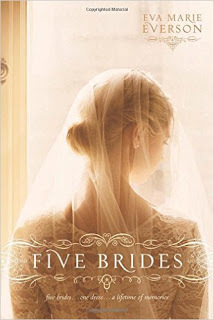 Five Brides
released and, in time, climbed to #1 on the CBA Bestselling list for historical fiction, and within the top 50 overall. I couldn’t have been more thrilled, even as I began working on a new novel, this one set in WWII. Like Five Brides, my new work, The One True Love of Alice-Ann (which releases in 2017), is based on a true story I heard many years ago. The couple who shared with my husband and me their most amazing love story have passed away and so, once again, I found myself unable to get the details. But I knew enough in order to begin building the story. Because the work is set in WWII, finding already published work of real-life stories wasn’t so difficult. I talked with a few survivors of the war and those who held down the fort at home. I watched videos (some I wished I had not heard about) and listened carefully to the tales of hardships brought about by the second war to rock the 20th century. I also listened to my own heart and I realized we’re not so different, really—one generation to the next. Cut us and we bleed, to misquote William Shakespeare’s Merchant of Venice. “Tickle us and we laugh.” Something struck me as I typed “the end” on the last line of the last page. Really, there’s an awful lot of truth in every work of fiction, I decided. We novel writers are inspired by something we hear or see or read. Fragments of news wrapped in a blanket of truth that our minds—being wired as they are—take to vast places yet unknown. In Alice-Ann, I created a small town called Bynum, Georgia, but the truth is that Bynum is every small town in America, 1941 – 1944. As the writer, I had to stay true to her.
Five Brides
released and, in time, climbed to #1 on the CBA Bestselling list for historical fiction, and within the top 50 overall. I couldn’t have been more thrilled, even as I began working on a new novel, this one set in WWII. Like Five Brides, my new work, The One True Love of Alice-Ann (which releases in 2017), is based on a true story I heard many years ago. The couple who shared with my husband and me their most amazing love story have passed away and so, once again, I found myself unable to get the details. But I knew enough in order to begin building the story. Because the work is set in WWII, finding already published work of real-life stories wasn’t so difficult. I talked with a few survivors of the war and those who held down the fort at home. I watched videos (some I wished I had not heard about) and listened carefully to the tales of hardships brought about by the second war to rock the 20th century. I also listened to my own heart and I realized we’re not so different, really—one generation to the next. Cut us and we bleed, to misquote William Shakespeare’s Merchant of Venice. “Tickle us and we laugh.” Something struck me as I typed “the end” on the last line of the last page. Really, there’s an awful lot of truth in every work of fiction, I decided. We novel writers are inspired by something we hear or see or read. Fragments of news wrapped in a blanket of truth that our minds—being wired as they are—take to vast places yet unknown. In Alice-Ann, I created a small town called Bynum, Georgia, but the truth is that Bynum is every small town in America, 1941 – 1944. As the writer, I had to stay true to her.
I thought back to my novel Chasing Sunsets (currently free on Kindle, etc.) which begins with the courtroom drama where a divorced couple fight over the father’s summer visitation of their sons. In what should have been a clear-cut case of a judge warning the father against newly-single shenanigans in front of the boys became a father receiving additional time with his impressionable young sons. I hadn’t made this up. I’d seen it with my own eyes in the life of a friend who’d fought pretty much that same battle.
The follow-up novel, Waiting for Sunrise, focused on elements of mental health, familial abuse and dysfunction, and the healing hand of God. These issues are some I’ve seen time and again in ministry and in the lives of those who have touched mine. The plot points and conflict-drivers couldn’t be made up, they had to be extensively researched. They had to be real.
In Things Left Unspoken , I looked into the civil rights issues of the mid-1960s South. Again, I read … I watched videos … I reached into my own remembrances … I talked to the experts. So much so that I inadvertently included a real incident that had affected people I actually know!
The cream of the crop may be This Fine Life , which was written in 2009, released in 2010, but recently received some incredible reviews at Amazon after a PR blast. This Fine Life tells of a woman (Mariette) who marries the man of her dreams (Thayne) who, in turn, decides to become a preacher, which was not the life his young wife had signed up for. I interviewed dozens of pastors and their wives and, in creating the storyline from Thayne’s decision onward, told only true stories, collaboratively.
Truth is (ha-ha), fiction writers aren’t just made-up-storytellers. We hold a nugget of truth in our hands and, after a little while of tossing that nugget around, we weave a story around it, one that oftentimes holds elements of our own stories. But while that story may be fictitious, we are responsible to tell the truth about the era, the emotions, the events, etc. that shaped that period of time and the people who lived within it. We are responsible to be real about the end results of decisions made, about consequences to our actions, both good and bad. We are responsible to do our homework, which can oftentimes be more task-heavy than the actual writing of the work.
But that is what is required of us. To bring the truth to our readers so that God can work within their hearts, means we writers must know fact from fiction.
TWEETABLESTo bring TRUTH to our readers, writers must know fact from fiction - @EvaMarieEverson (Click to Tweet)
Fact from fiction - is there a difference - @EvaMarieEverson (Click to Tweet)
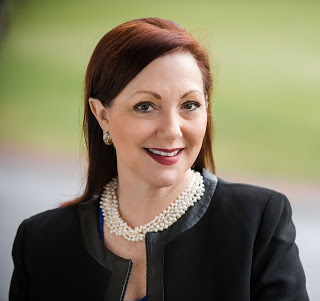 Eva Marie is a multiple award-winning author and speaker. She is one of the original five Orlando Word Weavers critique group members, an international and national group made up of critique chapters. She served as the original president from 2000 to 2007 and is now president of Word Weavers International, Inc. Eva Marie served as a mentor for Jerry B. Jenkins Christian Writers Guild for several years and has taught at a number of writers conferences nationwide. During the 2010-2011 school year, Eva Marie served as an adjunct professor at Taylor University in Upland, Indiana. She describes it as one of the best times she ever had while working. Eva Marie also serves as director of Florida Christian Writers Conference (along with Mark Hancock) and the Education Consultant for SON Studios.
Eva Marie is a multiple award-winning author and speaker. She is one of the original five Orlando Word Weavers critique group members, an international and national group made up of critique chapters. She served as the original president from 2000 to 2007 and is now president of Word Weavers International, Inc. Eva Marie served as a mentor for Jerry B. Jenkins Christian Writers Guild for several years and has taught at a number of writers conferences nationwide. During the 2010-2011 school year, Eva Marie served as an adjunct professor at Taylor University in Upland, Indiana. She describes it as one of the best times she ever had while working. Eva Marie also serves as director of Florida Christian Writers Conference (along with Mark Hancock) and the Education Consultant for SON Studios.
She is both a past and current student at Andersonville Theological Seminary where she plans to receive her Masters in Old Testament Theology sometime before her ninetieth birthday. Eva Marie and her husband make their home in Central Florida where they are owned by one very spoiled dog, a funky chicken, and two hearts-full of grandchildren.
*Carol Award Winner for The Potluck Club**ICRS Gold Medallion Finalist***Multiple awards, including 2012 Inspirational Readers Choice Award & Maggie Award (Chasing Sunsets), 2013 Maggie Award & 2013 Christy finalist for Waiting for Sunrise, 2014 AWSA Golden Scroll Award (Slow Moon Rising), 2015 AWSA Golden Scroll Award (The Road to Testament)
****CBA Bestseller List several months running and a finalist for Retailers Choice Awards, 2013
 In the past few years I’ve found myself in a strange predicament. For a fiction writer, I’ve been telling a lot of truths. This realization began years ago when I heard the story of Joan Hunt Zimmerman. My friend, Sharon Decker, who happened to also be a friend of Mrs. Zimmerman told me about her. “What do you think,” she said, “of a woman who comes from England to American after World War II, moves in with four strangers, and ends up buying a wedding dress with them?”I admit it. I was intrigued. So much so that I stayed quiet about it, telling only my agent. And my mother. She was intrigued too. I wanted to interview Mrs. Zimmerman, but her schedule as founder of Southern Shows,along with the unexpected passing of a sister in England, caused us to have to put the initial interview on hold. In fact, for quite a while. Still, I remained moot on the fact that she’d granted me not only the interview but the coveted story. (I would learn when interviewing her husband that many writers had begged for it, but I was the only one to get it.)
In the past few years I’ve found myself in a strange predicament. For a fiction writer, I’ve been telling a lot of truths. This realization began years ago when I heard the story of Joan Hunt Zimmerman. My friend, Sharon Decker, who happened to also be a friend of Mrs. Zimmerman told me about her. “What do you think,” she said, “of a woman who comes from England to American after World War II, moves in with four strangers, and ends up buying a wedding dress with them?”I admit it. I was intrigued. So much so that I stayed quiet about it, telling only my agent. And my mother. She was intrigued too. I wanted to interview Mrs. Zimmerman, but her schedule as founder of Southern Shows,along with the unexpected passing of a sister in England, caused us to have to put the initial interview on hold. In fact, for quite a while. Still, I remained moot on the fact that she’d granted me not only the interview but the coveted story. (I would learn when interviewing her husband that many writers had begged for it, but I was the only one to get it.)
 Finally, I met with Joan at a Panera Bread restaurant in North Carolina near her home. There, she regaled me with her story while showing off old photos of her roommates, a young and dashing Robert Zimmerman and her during their dating years, and—of course—photos of her wedding day in which she wore “the dress.” With enough information on the story, I created a plot synopsis, sent it to my agent, who then shopped it with editors. Within a short period of time, we had a bite. Then we had a contract. Then we signed a contract … and then the publishing house folded its fiction line. Disappointed, I shared my woes with Jan Stob, fiction acquisitions editor at Tyndale Publishing. However, I didn’t lament with an editor. First and foremost, Jan is my friend and has been for many years. So technically, I cried over the proverbial spilled milk with my friend. Within a half a breath Jan let me know she wanted to see the proposal. Shortly thereafter I signed a contract with Tyndale (my first), and then, as the ink dried, I began the task of learning even more about the real story I was about to fictionalize. The biggest problem with this was that Joan—one of five roommates in the early 1950s—seemed to be the only survivor. Extensive research brought me to the unfortunate knowledge that the others had passed away, one only a few months earlier. Getting their stories would not be possible. “I’m giving you carte blanche,” Joan said after I’d informed her. “Tell my story but create theirs.” And so I did. But when you tell a true story as fiction, there’s more to be considered than the facts or the major dramatic question (Can five near-strangers buy one dress and share it on their wedding days?) There’s location. There’s era. There is fashion and language and history. I realized that if I were going to write this novel with any sense of reality, I had to dive into the time, the places, and the people. And so I did.
Finally, I met with Joan at a Panera Bread restaurant in North Carolina near her home. There, she regaled me with her story while showing off old photos of her roommates, a young and dashing Robert Zimmerman and her during their dating years, and—of course—photos of her wedding day in which she wore “the dress.” With enough information on the story, I created a plot synopsis, sent it to my agent, who then shopped it with editors. Within a short period of time, we had a bite. Then we had a contract. Then we signed a contract … and then the publishing house folded its fiction line. Disappointed, I shared my woes with Jan Stob, fiction acquisitions editor at Tyndale Publishing. However, I didn’t lament with an editor. First and foremost, Jan is my friend and has been for many years. So technically, I cried over the proverbial spilled milk with my friend. Within a half a breath Jan let me know she wanted to see the proposal. Shortly thereafter I signed a contract with Tyndale (my first), and then, as the ink dried, I began the task of learning even more about the real story I was about to fictionalize. The biggest problem with this was that Joan—one of five roommates in the early 1950s—seemed to be the only survivor. Extensive research brought me to the unfortunate knowledge that the others had passed away, one only a few months earlier. Getting their stories would not be possible. “I’m giving you carte blanche,” Joan said after I’d informed her. “Tell my story but create theirs.” And so I did. But when you tell a true story as fiction, there’s more to be considered than the facts or the major dramatic question (Can five near-strangers buy one dress and share it on their wedding days?) There’s location. There’s era. There is fashion and language and history. I realized that if I were going to write this novel with any sense of reality, I had to dive into the time, the places, and the people. And so I did.
 Five Brides
released and, in time, climbed to #1 on the CBA Bestselling list for historical fiction, and within the top 50 overall. I couldn’t have been more thrilled, even as I began working on a new novel, this one set in WWII. Like Five Brides, my new work, The One True Love of Alice-Ann (which releases in 2017), is based on a true story I heard many years ago. The couple who shared with my husband and me their most amazing love story have passed away and so, once again, I found myself unable to get the details. But I knew enough in order to begin building the story. Because the work is set in WWII, finding already published work of real-life stories wasn’t so difficult. I talked with a few survivors of the war and those who held down the fort at home. I watched videos (some I wished I had not heard about) and listened carefully to the tales of hardships brought about by the second war to rock the 20th century. I also listened to my own heart and I realized we’re not so different, really—one generation to the next. Cut us and we bleed, to misquote William Shakespeare’s Merchant of Venice. “Tickle us and we laugh.” Something struck me as I typed “the end” on the last line of the last page. Really, there’s an awful lot of truth in every work of fiction, I decided. We novel writers are inspired by something we hear or see or read. Fragments of news wrapped in a blanket of truth that our minds—being wired as they are—take to vast places yet unknown. In Alice-Ann, I created a small town called Bynum, Georgia, but the truth is that Bynum is every small town in America, 1941 – 1944. As the writer, I had to stay true to her.
Five Brides
released and, in time, climbed to #1 on the CBA Bestselling list for historical fiction, and within the top 50 overall. I couldn’t have been more thrilled, even as I began working on a new novel, this one set in WWII. Like Five Brides, my new work, The One True Love of Alice-Ann (which releases in 2017), is based on a true story I heard many years ago. The couple who shared with my husband and me their most amazing love story have passed away and so, once again, I found myself unable to get the details. But I knew enough in order to begin building the story. Because the work is set in WWII, finding already published work of real-life stories wasn’t so difficult. I talked with a few survivors of the war and those who held down the fort at home. I watched videos (some I wished I had not heard about) and listened carefully to the tales of hardships brought about by the second war to rock the 20th century. I also listened to my own heart and I realized we’re not so different, really—one generation to the next. Cut us and we bleed, to misquote William Shakespeare’s Merchant of Venice. “Tickle us and we laugh.” Something struck me as I typed “the end” on the last line of the last page. Really, there’s an awful lot of truth in every work of fiction, I decided. We novel writers are inspired by something we hear or see or read. Fragments of news wrapped in a blanket of truth that our minds—being wired as they are—take to vast places yet unknown. In Alice-Ann, I created a small town called Bynum, Georgia, but the truth is that Bynum is every small town in America, 1941 – 1944. As the writer, I had to stay true to her. I thought back to my novel Chasing Sunsets (currently free on Kindle, etc.) which begins with the courtroom drama where a divorced couple fight over the father’s summer visitation of their sons. In what should have been a clear-cut case of a judge warning the father against newly-single shenanigans in front of the boys became a father receiving additional time with his impressionable young sons. I hadn’t made this up. I’d seen it with my own eyes in the life of a friend who’d fought pretty much that same battle.
The follow-up novel, Waiting for Sunrise, focused on elements of mental health, familial abuse and dysfunction, and the healing hand of God. These issues are some I’ve seen time and again in ministry and in the lives of those who have touched mine. The plot points and conflict-drivers couldn’t be made up, they had to be extensively researched. They had to be real.
In Things Left Unspoken , I looked into the civil rights issues of the mid-1960s South. Again, I read … I watched videos … I reached into my own remembrances … I talked to the experts. So much so that I inadvertently included a real incident that had affected people I actually know!
The cream of the crop may be This Fine Life , which was written in 2009, released in 2010, but recently received some incredible reviews at Amazon after a PR blast. This Fine Life tells of a woman (Mariette) who marries the man of her dreams (Thayne) who, in turn, decides to become a preacher, which was not the life his young wife had signed up for. I interviewed dozens of pastors and their wives and, in creating the storyline from Thayne’s decision onward, told only true stories, collaboratively.
Truth is (ha-ha), fiction writers aren’t just made-up-storytellers. We hold a nugget of truth in our hands and, after a little while of tossing that nugget around, we weave a story around it, one that oftentimes holds elements of our own stories. But while that story may be fictitious, we are responsible to tell the truth about the era, the emotions, the events, etc. that shaped that period of time and the people who lived within it. We are responsible to be real about the end results of decisions made, about consequences to our actions, both good and bad. We are responsible to do our homework, which can oftentimes be more task-heavy than the actual writing of the work.
But that is what is required of us. To bring the truth to our readers so that God can work within their hearts, means we writers must know fact from fiction.
TWEETABLESTo bring TRUTH to our readers, writers must know fact from fiction - @EvaMarieEverson (Click to Tweet)
Fact from fiction - is there a difference - @EvaMarieEverson (Click to Tweet)
 Eva Marie is a multiple award-winning author and speaker. She is one of the original five Orlando Word Weavers critique group members, an international and national group made up of critique chapters. She served as the original president from 2000 to 2007 and is now president of Word Weavers International, Inc. Eva Marie served as a mentor for Jerry B. Jenkins Christian Writers Guild for several years and has taught at a number of writers conferences nationwide. During the 2010-2011 school year, Eva Marie served as an adjunct professor at Taylor University in Upland, Indiana. She describes it as one of the best times she ever had while working. Eva Marie also serves as director of Florida Christian Writers Conference (along with Mark Hancock) and the Education Consultant for SON Studios.
Eva Marie is a multiple award-winning author and speaker. She is one of the original five Orlando Word Weavers critique group members, an international and national group made up of critique chapters. She served as the original president from 2000 to 2007 and is now president of Word Weavers International, Inc. Eva Marie served as a mentor for Jerry B. Jenkins Christian Writers Guild for several years and has taught at a number of writers conferences nationwide. During the 2010-2011 school year, Eva Marie served as an adjunct professor at Taylor University in Upland, Indiana. She describes it as one of the best times she ever had while working. Eva Marie also serves as director of Florida Christian Writers Conference (along with Mark Hancock) and the Education Consultant for SON Studios.She is both a past and current student at Andersonville Theological Seminary where she plans to receive her Masters in Old Testament Theology sometime before her ninetieth birthday. Eva Marie and her husband make their home in Central Florida where they are owned by one very spoiled dog, a funky chicken, and two hearts-full of grandchildren.
*Carol Award Winner for The Potluck Club**ICRS Gold Medallion Finalist***Multiple awards, including 2012 Inspirational Readers Choice Award & Maggie Award (Chasing Sunsets), 2013 Maggie Award & 2013 Christy finalist for Waiting for Sunrise, 2014 AWSA Golden Scroll Award (Slow Moon Rising), 2015 AWSA Golden Scroll Award (The Road to Testament)
****CBA Bestseller List several months running and a finalist for Retailers Choice Awards, 2013
Published on July 26, 2016 01:00
July 25, 2016
Grow Your Blog by Using Twitter
by Edie Melson @EdieMelson
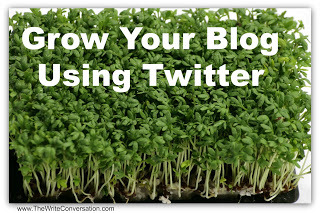 I’ve never met anyone who has a blog and doesn’t want it to grow. One of the best ways to see that growth is to spend a little bit of time with Twitter. With the judicious use of
Hashtags
and a little consistent tweeting you can add another layer to your blog audience. Here’s how:1. Make certain you have utilized your Twitter profile. People who visit your profile on Twitter will often go a step further and take a peek at your blog. Here are the things you need to have:A picture, preferably a full face shot with a smile.A link to your blog.An interesting and informative bio.
I’ve never met anyone who has a blog and doesn’t want it to grow. One of the best ways to see that growth is to spend a little bit of time with Twitter. With the judicious use of
Hashtags
and a little consistent tweeting you can add another layer to your blog audience. Here’s how:1. Make certain you have utilized your Twitter profile. People who visit your profile on Twitter will often go a step further and take a peek at your blog. Here are the things you need to have:A picture, preferably a full face shot with a smile.A link to your blog.An interesting and informative bio.
 Use headline techniques to compose tweets2. Use headline techniques to compose your tweets. These are the basic things to consider:It must provide the reader with a true glimpse of what to expect in your blog post.It needs to resonate with your reader’s urgency.It contains a compelling reason to visit the link.And most important: It does NOT give away the ending. Here’s a post I wrote on how to Utilize Headline Techniques to Compose Social MediaUpdates.
Use headline techniques to compose tweets2. Use headline techniques to compose your tweets. These are the basic things to consider:It must provide the reader with a true glimpse of what to expect in your blog post.It needs to resonate with your reader’s urgency.It contains a compelling reason to visit the link.And most important: It does NOT give away the ending. Here’s a post I wrote on how to Utilize Headline Techniques to Compose Social MediaUpdates.
3. Plan tweets about your blog within the framework of Edie's 5 to 1 rule. Not familiar with my rule? Here it is again: For every 5 social media updates only 1 can be about you. If the other five updates are valuable to your audience they will come to trust you and be much more likely to visit the links you provide.
 Always include at least one hashtag.4. Always include at least one Hashtag (and no more than three) to expose your tweet to new people. This step is key. If you’re not familiar with Hashtags, visit my post on Twitter Hashtags here.
Always include at least one hashtag.4. Always include at least one Hashtag (and no more than three) to expose your tweet to new people. This step is key. If you’re not familiar with Hashtags, visit my post on Twitter Hashtags here.
5. Be consistent in your use of Twitter. Try to schedule at least six Tweets every day. You can do this in the morning by utilizing a scheduling program like Hootsuite.
Using these techniques I’ve increased the visibility of my blog and grown my Twitter followers. These simple steps can work for you as well.
Don’t forget to join the conversation!Blessings,
Edie
TWEETABLEGrow Your Blog by Using Twitter - @EdieMelson (Click to Tweet)
 I’ve never met anyone who has a blog and doesn’t want it to grow. One of the best ways to see that growth is to spend a little bit of time with Twitter. With the judicious use of
Hashtags
and a little consistent tweeting you can add another layer to your blog audience. Here’s how:1. Make certain you have utilized your Twitter profile. People who visit your profile on Twitter will often go a step further and take a peek at your blog. Here are the things you need to have:A picture, preferably a full face shot with a smile.A link to your blog.An interesting and informative bio.
I’ve never met anyone who has a blog and doesn’t want it to grow. One of the best ways to see that growth is to spend a little bit of time with Twitter. With the judicious use of
Hashtags
and a little consistent tweeting you can add another layer to your blog audience. Here’s how:1. Make certain you have utilized your Twitter profile. People who visit your profile on Twitter will often go a step further and take a peek at your blog. Here are the things you need to have:A picture, preferably a full face shot with a smile.A link to your blog.An interesting and informative bio.  Use headline techniques to compose tweets2. Use headline techniques to compose your tweets. These are the basic things to consider:It must provide the reader with a true glimpse of what to expect in your blog post.It needs to resonate with your reader’s urgency.It contains a compelling reason to visit the link.And most important: It does NOT give away the ending. Here’s a post I wrote on how to Utilize Headline Techniques to Compose Social MediaUpdates.
Use headline techniques to compose tweets2. Use headline techniques to compose your tweets. These are the basic things to consider:It must provide the reader with a true glimpse of what to expect in your blog post.It needs to resonate with your reader’s urgency.It contains a compelling reason to visit the link.And most important: It does NOT give away the ending. Here’s a post I wrote on how to Utilize Headline Techniques to Compose Social MediaUpdates. 3. Plan tweets about your blog within the framework of Edie's 5 to 1 rule. Not familiar with my rule? Here it is again: For every 5 social media updates only 1 can be about you. If the other five updates are valuable to your audience they will come to trust you and be much more likely to visit the links you provide.
 Always include at least one hashtag.4. Always include at least one Hashtag (and no more than three) to expose your tweet to new people. This step is key. If you’re not familiar with Hashtags, visit my post on Twitter Hashtags here.
Always include at least one hashtag.4. Always include at least one Hashtag (and no more than three) to expose your tweet to new people. This step is key. If you’re not familiar with Hashtags, visit my post on Twitter Hashtags here. 5. Be consistent in your use of Twitter. Try to schedule at least six Tweets every day. You can do this in the morning by utilizing a scheduling program like Hootsuite.
Using these techniques I’ve increased the visibility of my blog and grown my Twitter followers. These simple steps can work for you as well.
Don’t forget to join the conversation!Blessings,
Edie
TWEETABLEGrow Your Blog by Using Twitter - @EdieMelson (Click to Tweet)
Published on July 25, 2016 01:00
July 24, 2016
Make a Name for Myself? Or Make a Self for My Name?
Edie here. Today I'm excited to introduce you to the newest member of our blogging team here at The Write Conversation. I've been a fan of Rhonda's for years and I'm so excited to also call her my friend. I'm sure you'll be as blessed as me by her wit and wisdom.
Make a Name for Myself? Or Make a Self for My Name?
by Rhonda Rhea @RhondaRhea
Life as an author has enough unabashed self-promotion connected to it to make most normal people blush. Or at least make them a little uncomfortable. Me? I’ve tried repeatedly to convince my publisher that a life-sized cardboard cutout of me would be a good idea. Of course, mostly I’ve wanted to have it at a book-signing sometime just so I could say something like, “I’m so happy to be here that I’m beside myself.” Beside myself?Beside myself? Get it? Then I would mention something about a “double standard.” Then I would point with both hands in an over-animated manner at the paper me with an awkward, toothy grin and way too much eyebrow action.
Beside myself?Beside myself? Get it? Then I would mention something about a “double standard.” Then I would point with both hands in an over-animated manner at the paper me with an awkward, toothy grin and way too much eyebrow action.
I did tell my publisher several times that I’m quite sure a life-sized figure of me would be a real bargain. I’m five-foot, zero inches tall and I don’t even do big hair anymore, so how much cardboard would they even need?
I’m pretty happy, actually, that every time I’ve mentioned the life-sized likeness, the publisher has fought the urge to point out that the thing could also probably handle about 85% of my workload. Such nice people, they are.
It does beg this question, though. Do I want to make a name for myself? Or do I want to make a self for my name? Actually—jokes aside and tongue removed from cheek—I want…neither. For one thing, we’re told in Proverbs 27:3 to “Let another praise you, and not your own mouth—a stranger, and not your own lips,” So that point is clear. Sigh. Self-praise is not what these lips were built for. Probably not what cardboard lips are built for either. So lip-adjustments are currently—and pretty much always—underway. It’s a process.
More importantly, anytime I’m focusing on “me, my-cardboard-self and I”—my name and my fame—my focus is altogether off. The truth is, there’s only one name worthy of all promotion. As the psalmist prayed, “Yahweh, Your name endures forever, Your reputation, Yahweh, through all generations” (Psalm 135:13 HCSB).
How foolish I am when I make life about my own fame or fortune. And how empty life becomes when it’s focused on possessions, position or power. “Some trust in chariots and some in horses, but we trust in the name of the Lord our God” (Psalm 20:7 ESV). Trusting in His name. That’s what brings life around to a right focus on His name, His fame.
It boils down to Paul’s charge in Colossians 3:17: “And whatever you do, in word or in deed, do everything in the name of the Lord Jesus, giving thanks to God the Father through Him,” (HCSB). All self aside, real and cardboard, we’re to make every detail of life about and in His great name.
That focus? It never fails to lead me to a place of surrender. Lord, I surrender my reputation into Your hands. I surrender my success—whatever that might look like—into Your hands. I put my name in Your hands. May the glory of Your name—Your wonderful name—be my reason for doing everything I do, all by Your power, through Your indwelling presence. All thanks to You. In. Your. Name.
Other promotions will come and go. His name is forever.
That means I don’t have to worry so much about my own name. I’ll probably eventually even let go of that cardboard facsimile idea. Never mind that it could come in really handy in the carpool lane.
TWEETABLESPutting our #writing names in God's hands is a safe place - @RhondaRhea (Click to Tweet)
Do I want to make a name for myself? Make a self for my name? @RhondaRhea (Click to Tweet)
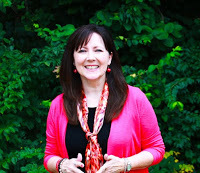 Rhonda Rhea is a humor columnist for lots of great magazines, including HomeLife, Leading Hearts, The Pathway and more. She is the author of 10 nonfiction books, including How Many Lightbulbs Does It Take to Change a Person? and coauthors fiction with her daughter, Kaley Faith Rhea. She and her daughters host the TV show, That’s My Mom, for Christian Television Network’s KNLJ. Rhonda enjoys traveling the country speaking at all kinds of conferences and events. She and her pastor/hubs have five grown children and live in the St. Louis area.
Rhonda Rhea is a humor columnist for lots of great magazines, including HomeLife, Leading Hearts, The Pathway and more. She is the author of 10 nonfiction books, including How Many Lightbulbs Does It Take to Change a Person? and coauthors fiction with her daughter, Kaley Faith Rhea. She and her daughters host the TV show, That’s My Mom, for Christian Television Network’s KNLJ. Rhonda enjoys traveling the country speaking at all kinds of conferences and events. She and her pastor/hubs have five grown children and live in the St. Louis area.
Make a Name for Myself? Or Make a Self for My Name?
by Rhonda Rhea @RhondaRhea
Life as an author has enough unabashed self-promotion connected to it to make most normal people blush. Or at least make them a little uncomfortable. Me? I’ve tried repeatedly to convince my publisher that a life-sized cardboard cutout of me would be a good idea. Of course, mostly I’ve wanted to have it at a book-signing sometime just so I could say something like, “I’m so happy to be here that I’m beside myself.”
 Beside myself?Beside myself? Get it? Then I would mention something about a “double standard.” Then I would point with both hands in an over-animated manner at the paper me with an awkward, toothy grin and way too much eyebrow action.
Beside myself?Beside myself? Get it? Then I would mention something about a “double standard.” Then I would point with both hands in an over-animated manner at the paper me with an awkward, toothy grin and way too much eyebrow action.I did tell my publisher several times that I’m quite sure a life-sized figure of me would be a real bargain. I’m five-foot, zero inches tall and I don’t even do big hair anymore, so how much cardboard would they even need?
I’m pretty happy, actually, that every time I’ve mentioned the life-sized likeness, the publisher has fought the urge to point out that the thing could also probably handle about 85% of my workload. Such nice people, they are.
It does beg this question, though. Do I want to make a name for myself? Or do I want to make a self for my name? Actually—jokes aside and tongue removed from cheek—I want…neither. For one thing, we’re told in Proverbs 27:3 to “Let another praise you, and not your own mouth—a stranger, and not your own lips,” So that point is clear. Sigh. Self-praise is not what these lips were built for. Probably not what cardboard lips are built for either. So lip-adjustments are currently—and pretty much always—underway. It’s a process.
More importantly, anytime I’m focusing on “me, my-cardboard-self and I”—my name and my fame—my focus is altogether off. The truth is, there’s only one name worthy of all promotion. As the psalmist prayed, “Yahweh, Your name endures forever, Your reputation, Yahweh, through all generations” (Psalm 135:13 HCSB).
How foolish I am when I make life about my own fame or fortune. And how empty life becomes when it’s focused on possessions, position or power. “Some trust in chariots and some in horses, but we trust in the name of the Lord our God” (Psalm 20:7 ESV). Trusting in His name. That’s what brings life around to a right focus on His name, His fame.
It boils down to Paul’s charge in Colossians 3:17: “And whatever you do, in word or in deed, do everything in the name of the Lord Jesus, giving thanks to God the Father through Him,” (HCSB). All self aside, real and cardboard, we’re to make every detail of life about and in His great name.
That focus? It never fails to lead me to a place of surrender. Lord, I surrender my reputation into Your hands. I surrender my success—whatever that might look like—into Your hands. I put my name in Your hands. May the glory of Your name—Your wonderful name—be my reason for doing everything I do, all by Your power, through Your indwelling presence. All thanks to You. In. Your. Name.
Other promotions will come and go. His name is forever.
That means I don’t have to worry so much about my own name. I’ll probably eventually even let go of that cardboard facsimile idea. Never mind that it could come in really handy in the carpool lane.
TWEETABLESPutting our #writing names in God's hands is a safe place - @RhondaRhea (Click to Tweet)
Do I want to make a name for myself? Make a self for my name? @RhondaRhea (Click to Tweet)
 Rhonda Rhea is a humor columnist for lots of great magazines, including HomeLife, Leading Hearts, The Pathway and more. She is the author of 10 nonfiction books, including How Many Lightbulbs Does It Take to Change a Person? and coauthors fiction with her daughter, Kaley Faith Rhea. She and her daughters host the TV show, That’s My Mom, for Christian Television Network’s KNLJ. Rhonda enjoys traveling the country speaking at all kinds of conferences and events. She and her pastor/hubs have five grown children and live in the St. Louis area.
Rhonda Rhea is a humor columnist for lots of great magazines, including HomeLife, Leading Hearts, The Pathway and more. She is the author of 10 nonfiction books, including How Many Lightbulbs Does It Take to Change a Person? and coauthors fiction with her daughter, Kaley Faith Rhea. She and her daughters host the TV show, That’s My Mom, for Christian Television Network’s KNLJ. Rhonda enjoys traveling the country speaking at all kinds of conferences and events. She and her pastor/hubs have five grown children and live in the St. Louis area.
Published on July 24, 2016 01:00
July 22, 2016
Rest
By Edie Melson @EdieMelson

How do you find rest? Kirk and I live to retreat to the mountains- or sometimes the seaside.
Share your answers in the comment section below.
I also invite you to use this image any way you like online. Post it to your blog, share it on Facebook, Twitter, Pinterest, anywhere you'd like. All I ask is that you keep it intact, with my website watermark.
Don't forget to join the conversation!Blessings,Edie

How do you find rest? Kirk and I live to retreat to the mountains- or sometimes the seaside.
Share your answers in the comment section below.
I also invite you to use this image any way you like online. Post it to your blog, share it on Facebook, Twitter, Pinterest, anywhere you'd like. All I ask is that you keep it intact, with my website watermark.
Don't forget to join the conversation!Blessings,Edie
Published on July 22, 2016 19:55
Why You Won’t Submit Your Writing After a Conference
By Lori Hatcher @LoriHatcher2
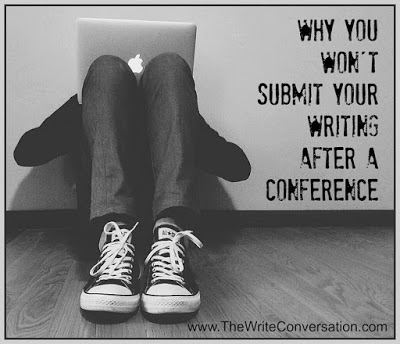 You attended a writers conference recently and met with industry professionals. You pitched a book, an article, or a blog post, and someone said the words you hoped to hear, “Yes! Send it to me.”
You attended a writers conference recently and met with industry professionals. You pitched a book, an article, or a blog post, and someone said the words you hoped to hear, “Yes! Send it to me.”
Yet 70 percent of you won’t submit it.
This surprising statistic is why most wanna-be writers won’t make it. Not because they’re not good enough, but because they won’t try. And try. And try again.One of the first mantras I learned as a child was, “If at first you don’t succeed, try, try again.” I had no idea my parents were preparing me for a writer’s life, but this adage has proven to be one of the best pieces of advice I’ve ever applied to my writing career.
As the editor of a regional magazine, I often meet with writers, either formally at writers’ conferences, or informally through mutual friends. When they share their writing with me, I respond in a variety of ways. I may offer a critique, including ideas for how they can improve. I may suggest a suitable publication to pitch to. Or I may invite them to formally submit their piece to me.
Some do, and some don’t.
As unfortunate as this is, I understand why, because I didn’t submit my work the first time a professional asked me to, either.
I believe there are at least three reasons why writers don’t submit their work when an editor, agent, or publisher invites them to:
1. We think they’re just being nice. I had the opportunity to propose a book idea to a publisher at my very first writers’ conference.
“Do you think this might be a book possibility?” I asked, after I described my project.
“Maybe,” he said. “Send me some samples.”
I went home from the conference and did absolutely nothing. I dismissed his request as a kind attempt to encourage a fledgling writer, not a serious offer. Now that I’m a magazine editor, I know the truth—editors and publishers are far too busy to request material they don’t think has potential. There are many ways to encourage writers whose work isn’t quite ready for publication, but asking for submissions isn’t one of them.
 We don't truly believe in our work. 2. We don’t truly believe in our work. When I thought about sending the samples the publisher had invited me to submit, naysaying voices started whispering in my ears. Why would anyone want to read what you’ve written? You’re not a professional writer. What if he reads it and thinks it’s a piece of junk? What if you get your hopes up and he rejects it? What if you waste all that time and have nothing to show for it?
We don't truly believe in our work. 2. We don’t truly believe in our work. When I thought about sending the samples the publisher had invited me to submit, naysaying voices started whispering in my ears. Why would anyone want to read what you’ve written? You’re not a professional writer. What if he reads it and thinks it’s a piece of junk? What if you get your hopes up and he rejects it? What if you waste all that time and have nothing to show for it?
I let my insecurities and fears keep me from seizing an opportunity to share my writing with others. Instead of giving my writing a chance to succeed, I doomed my writing to fail.
3. I didn’t believe God had a plan for my writing. Before I left for the conference, I had prayed, “Lord, I have no abilities apart from the ones you’ve given me. Open the doors you want me to walk through and close the doors you want shut. Connect me with those who can help me grow as a writer. Fulfill your good plan for me, and use my writing to encourage others.”
When I dismissed the publisher’s offer to submit, however, what I said in essence was, “Lord, the abilities you’ve given me aren’t enough. I don’t believe you really answered my prayer for open doors, and I don’t believe this opportunity came from you—even though I asked you for it. I don’t believe you can use this experience to help me grow as a writer, nor can you use my writing to help others.”
We’d never dream of saying something like this to God, but this is exactly what our actions communicate when we fail to walk through open doors of opportunity.
Thankfully, months later, when I mentioned the invitation I’d ignored, seasoned writer friends grabbed me by the collar and shook me. Their collective horror that I’d rejected such an offer, paired with their assurances that professionals don’t ask for submissions unless they’re serious lit a fire under me. My first devotional book, Joy in the Journey – Encouragement for Homeschooling Moms, was the result.
The takeaway? Don’t be part of the 70 percent who don’t succeed because they don’t try. Be part of the 30 percent who try, try, and try again.
Have you ever ignored an opportunity to submit your work? I’d love to hear why. Or maybe you’ve struggled with another step in the writing journey. Leave a comment below and join the conversation.
TWEETABLEWhy you won't submit your #writing after a conference - @LoriHatcher2 (Click to Tweet)
 Lori Hatcher is the editor of
Reach Out, Columbia
magazine and the author of two devotional books,
Hungry for God … Starving for Time, Five-Minute Devotions for Busy Women
and Joy in the Journey – Encouragement for Homeschooling Moms. A blogger, writing instructor, and women’s ministry speaker, her goal is to help women connect with God in the craziness of life You’ll find her pondering the marvelous and the mundane on her blog,
Hungry for God. . . Starving for Time
. Connect with her on Facebook, Twitter (@LoriHatcher2), or Pinterest (Hungry for God).
Lori Hatcher is the editor of
Reach Out, Columbia
magazine and the author of two devotional books,
Hungry for God … Starving for Time, Five-Minute Devotions for Busy Women
and Joy in the Journey – Encouragement for Homeschooling Moms. A blogger, writing instructor, and women’s ministry speaker, her goal is to help women connect with God in the craziness of life You’ll find her pondering the marvelous and the mundane on her blog,
Hungry for God. . . Starving for Time
. Connect with her on Facebook, Twitter (@LoriHatcher2), or Pinterest (Hungry for God).
 You attended a writers conference recently and met with industry professionals. You pitched a book, an article, or a blog post, and someone said the words you hoped to hear, “Yes! Send it to me.”
You attended a writers conference recently and met with industry professionals. You pitched a book, an article, or a blog post, and someone said the words you hoped to hear, “Yes! Send it to me.” Yet 70 percent of you won’t submit it.
This surprising statistic is why most wanna-be writers won’t make it. Not because they’re not good enough, but because they won’t try. And try. And try again.One of the first mantras I learned as a child was, “If at first you don’t succeed, try, try again.” I had no idea my parents were preparing me for a writer’s life, but this adage has proven to be one of the best pieces of advice I’ve ever applied to my writing career.
As the editor of a regional magazine, I often meet with writers, either formally at writers’ conferences, or informally through mutual friends. When they share their writing with me, I respond in a variety of ways. I may offer a critique, including ideas for how they can improve. I may suggest a suitable publication to pitch to. Or I may invite them to formally submit their piece to me.
Some do, and some don’t.
As unfortunate as this is, I understand why, because I didn’t submit my work the first time a professional asked me to, either.
I believe there are at least three reasons why writers don’t submit their work when an editor, agent, or publisher invites them to:
1. We think they’re just being nice. I had the opportunity to propose a book idea to a publisher at my very first writers’ conference.
“Do you think this might be a book possibility?” I asked, after I described my project.
“Maybe,” he said. “Send me some samples.”
I went home from the conference and did absolutely nothing. I dismissed his request as a kind attempt to encourage a fledgling writer, not a serious offer. Now that I’m a magazine editor, I know the truth—editors and publishers are far too busy to request material they don’t think has potential. There are many ways to encourage writers whose work isn’t quite ready for publication, but asking for submissions isn’t one of them.
 We don't truly believe in our work. 2. We don’t truly believe in our work. When I thought about sending the samples the publisher had invited me to submit, naysaying voices started whispering in my ears. Why would anyone want to read what you’ve written? You’re not a professional writer. What if he reads it and thinks it’s a piece of junk? What if you get your hopes up and he rejects it? What if you waste all that time and have nothing to show for it?
We don't truly believe in our work. 2. We don’t truly believe in our work. When I thought about sending the samples the publisher had invited me to submit, naysaying voices started whispering in my ears. Why would anyone want to read what you’ve written? You’re not a professional writer. What if he reads it and thinks it’s a piece of junk? What if you get your hopes up and he rejects it? What if you waste all that time and have nothing to show for it?I let my insecurities and fears keep me from seizing an opportunity to share my writing with others. Instead of giving my writing a chance to succeed, I doomed my writing to fail.
3. I didn’t believe God had a plan for my writing. Before I left for the conference, I had prayed, “Lord, I have no abilities apart from the ones you’ve given me. Open the doors you want me to walk through and close the doors you want shut. Connect me with those who can help me grow as a writer. Fulfill your good plan for me, and use my writing to encourage others.”
When I dismissed the publisher’s offer to submit, however, what I said in essence was, “Lord, the abilities you’ve given me aren’t enough. I don’t believe you really answered my prayer for open doors, and I don’t believe this opportunity came from you—even though I asked you for it. I don’t believe you can use this experience to help me grow as a writer, nor can you use my writing to help others.”
We’d never dream of saying something like this to God, but this is exactly what our actions communicate when we fail to walk through open doors of opportunity.
Thankfully, months later, when I mentioned the invitation I’d ignored, seasoned writer friends grabbed me by the collar and shook me. Their collective horror that I’d rejected such an offer, paired with their assurances that professionals don’t ask for submissions unless they’re serious lit a fire under me. My first devotional book, Joy in the Journey – Encouragement for Homeschooling Moms, was the result.
The takeaway? Don’t be part of the 70 percent who don’t succeed because they don’t try. Be part of the 30 percent who try, try, and try again.
Have you ever ignored an opportunity to submit your work? I’d love to hear why. Or maybe you’ve struggled with another step in the writing journey. Leave a comment below and join the conversation.
TWEETABLEWhy you won't submit your #writing after a conference - @LoriHatcher2 (Click to Tweet)
 Lori Hatcher is the editor of
Reach Out, Columbia
magazine and the author of two devotional books,
Hungry for God … Starving for Time, Five-Minute Devotions for Busy Women
and Joy in the Journey – Encouragement for Homeschooling Moms. A blogger, writing instructor, and women’s ministry speaker, her goal is to help women connect with God in the craziness of life You’ll find her pondering the marvelous and the mundane on her blog,
Hungry for God. . . Starving for Time
. Connect with her on Facebook, Twitter (@LoriHatcher2), or Pinterest (Hungry for God).
Lori Hatcher is the editor of
Reach Out, Columbia
magazine and the author of two devotional books,
Hungry for God … Starving for Time, Five-Minute Devotions for Busy Women
and Joy in the Journey – Encouragement for Homeschooling Moms. A blogger, writing instructor, and women’s ministry speaker, her goal is to help women connect with God in the craziness of life You’ll find her pondering the marvelous and the mundane on her blog,
Hungry for God. . . Starving for Time
. Connect with her on Facebook, Twitter (@LoriHatcher2), or Pinterest (Hungry for God).
Published on July 22, 2016 01:00
July 21, 2016
5 Ways to Write Using the Five Senses—Smell
by Cyle Young @CyleYoung
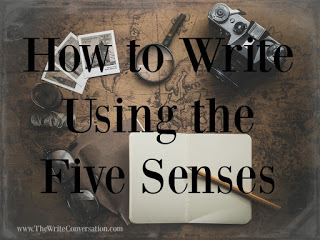 I don’t know about you, but every time I smell cinnamon rolls in the oven, I am transported back to 1980’s. My thoughts drift to waking up on Sunday morning to the sweet smell of breakfast baking in the kitchen. My stomach growls. My mouth salivates, and I can almost hear my mother rustling the dishes.
I don’t know about you, but every time I smell cinnamon rolls in the oven, I am transported back to 1980’s. My thoughts drift to waking up on Sunday morning to the sweet smell of breakfast baking in the kitchen. My stomach growls. My mouth salivates, and I can almost hear my mother rustling the dishes.
What a great memory from my childhood.
Smell has a powerful effect on our memories, and to be a great writer you must harness the power of smell along with your other four senses.Take at least 60 seconds and stare at this image. Put yourself in this setting. What three odors, scents, aromas, or fragrances do you smell in this picture?

What do you smell?
It’s hard to miss the flowering cherry trees. Their sweet blossoms waft a pleasant aroma into the air. But go deeper. Live the scene. What else can you smell?
An acrid tinge of smog undercuts the thick floral fragrance.
Or maybe a repulsive hint of body order lifts from the professional photographer as he pushes past in an attempt to get a few more photos before the sun ducks behind over the horizon?
Even the prettiest setting can have a dark side, or a dank scent.
The pungent scent of death emits from the motionless canal. The stench is reminiscent of those summer days spent at Beaver Lake fishing the man-made canals in hopes of landing a channel-cat. I never did catch one.
These smells are only a few of the many. Take another sixty-seconds and experience the picture.
What memories come back? And what else do you smell?
Leave your unique description of what you “smell” in the comments below. Make sure to take the time to always smell your setting, or storyworld and take care to describe it in an exceptionally engaging way.
TWEETABLES5 Ways to #Write Using the Five Senses, Smell - @CyleYoung on@EdieMelson (Click to Tweet)
Don't forget to round out your #writing with all 5 senses - @CyleYoung (Click to Tweet)
 Cyle Young is thankful God blessed him with the uniqueness of being an ADD-riddled…SQUIRREL!...binge writer. Not much unlike the classic video game Frogger, Cyle darts back and forth between various writing genres. He crafts princess children’s stories, how-to advice for parents, epic fantasy tales, and easy readers.
Cyle Young is thankful God blessed him with the uniqueness of being an ADD-riddled…SQUIRREL!...binge writer. Not much unlike the classic video game Frogger, Cyle darts back and forth between various writing genres. He crafts princess children’s stories, how-to advice for parents, epic fantasy tales, and easy readers.
 I don’t know about you, but every time I smell cinnamon rolls in the oven, I am transported back to 1980’s. My thoughts drift to waking up on Sunday morning to the sweet smell of breakfast baking in the kitchen. My stomach growls. My mouth salivates, and I can almost hear my mother rustling the dishes.
I don’t know about you, but every time I smell cinnamon rolls in the oven, I am transported back to 1980’s. My thoughts drift to waking up on Sunday morning to the sweet smell of breakfast baking in the kitchen. My stomach growls. My mouth salivates, and I can almost hear my mother rustling the dishes.What a great memory from my childhood.
Smell has a powerful effect on our memories, and to be a great writer you must harness the power of smell along with your other four senses.Take at least 60 seconds and stare at this image. Put yourself in this setting. What three odors, scents, aromas, or fragrances do you smell in this picture?

What do you smell?
It’s hard to miss the flowering cherry trees. Their sweet blossoms waft a pleasant aroma into the air. But go deeper. Live the scene. What else can you smell?
An acrid tinge of smog undercuts the thick floral fragrance.
Or maybe a repulsive hint of body order lifts from the professional photographer as he pushes past in an attempt to get a few more photos before the sun ducks behind over the horizon?
Even the prettiest setting can have a dark side, or a dank scent.
The pungent scent of death emits from the motionless canal. The stench is reminiscent of those summer days spent at Beaver Lake fishing the man-made canals in hopes of landing a channel-cat. I never did catch one.
These smells are only a few of the many. Take another sixty-seconds and experience the picture.
What memories come back? And what else do you smell?
Leave your unique description of what you “smell” in the comments below. Make sure to take the time to always smell your setting, or storyworld and take care to describe it in an exceptionally engaging way.
TWEETABLES5 Ways to #Write Using the Five Senses, Smell - @CyleYoung on@EdieMelson (Click to Tweet)
Don't forget to round out your #writing with all 5 senses - @CyleYoung (Click to Tweet)
 Cyle Young is thankful God blessed him with the uniqueness of being an ADD-riddled…SQUIRREL!...binge writer. Not much unlike the classic video game Frogger, Cyle darts back and forth between various writing genres. He crafts princess children’s stories, how-to advice for parents, epic fantasy tales, and easy readers.
Cyle Young is thankful God blessed him with the uniqueness of being an ADD-riddled…SQUIRREL!...binge writer. Not much unlike the classic video game Frogger, Cyle darts back and forth between various writing genres. He crafts princess children’s stories, how-to advice for parents, epic fantasy tales, and easy readers.
Published on July 21, 2016 01:00
July 20, 2016
The Top 10 Elements for Writing an Effective Bible Study
by Katy Kauffman @KatyKauffman28
 If you’re a Bible study author, you’re a messenger of hope and truth. You’ve most likely read a study that affected you for good, and you want to be that kind of writer for others. God’s Word has the power to change lives and heal hearts, revive the soul and break bondage. As Bible study writers, let’s depend on God for the understanding, wisdom, and warmth we need to write our studies, and remember to include the most effective elements in our writing.
If you’re a Bible study author, you’re a messenger of hope and truth. You’ve most likely read a study that affected you for good, and you want to be that kind of writer for others. God’s Word has the power to change lives and heal hearts, revive the soul and break bondage. As Bible study writers, let’s depend on God for the understanding, wisdom, and warmth we need to write our studies, and remember to include the most effective elements in our writing.
Writing Bible studies doesn’t just involve seeing a treasure in Scripture and writing down thoughts about it. Writing is both science and art. There are good rules to follow, but there’s also room for personality and creativity. So what are the ten effective elements?Top 10 Elements to Include in Your Study
10. Good GrammarOf course, we want to offer excellent writing to our readers, but sometimes a sentence that sounds good to us may not sound good to others. Getting feedback from a critique group or writing buddy is crucial and makes your writing as reader friendly as possible.
9. Tight WritingA meandering train of thought may lose your readers’ interest, just as too many words in a sentence can overload them. Read your study out loud, and as you read, cut out what’s not absolutely needed. To ease that stress, see my post, 5 Reasons Why Writers Must Overcome the Pain of Deletion.
 Meaningful Prayers8. Meaningful PrayersAlthough this one isn’t seen in too many Bible studies today, it personalizes the application you make, and turns your book into a complete aid for a quiet time. Write prayers based on the principles you teach in your book—prayers that connect the reader to God’s heart and focus on doing the good He wants us to do. These can be three to five lines long and strategically placed at the end of each chapter.
Meaningful Prayers8. Meaningful PrayersAlthough this one isn’t seen in too many Bible studies today, it personalizes the application you make, and turns your book into a complete aid for a quiet time. Write prayers based on the principles you teach in your book—prayers that connect the reader to God’s heart and focus on doing the good He wants us to do. These can be three to five lines long and strategically placed at the end of each chapter.
7. Thought-Provoking QuestionsAsk questions that emphasize the application you want readers to understand and embrace. Draw out their experience with the topic, and ask questions that help them discover how to live out Scripture’s principles in daily life. Avoid questions with yes or no answers.
6. Attention-Grabbing Lead-InsEvery chapter needs a good lead-in to keep the readers’ interest. A scan of the first five pages of your book may determine whether someone buys it or not. For effective ideas on how to start books, chapters, and paragraphs, visit my column The Starting Line: First Lines, First Pages on Almost an Author.
5. Relevant Stories and IllustrationsIn addition to good lead-ins, stories and illustrations add interest, vitality, and richness to your Bible studies. For ideas, see For Non-fiction Authors: Tips for Choosing the Right Story.
4. A Concise Explanation of ScriptureThe key word is concise. Be sure to study a passage thoroughly, but limit how much information you pass along to the reader. Use definitions and commentary notes sparingly. For ideas of how to explain Scripture, see 8 Tips to Make Scripture Come Alive in Your Writing.
3. A Conversational VoiceWithout a conversational voice in your writing, even the most amazing take-away will fall flat. Let your love for Scripture, for God, and for the reader come through in the tone of your writing. Never talk at the reader, but to them as a friend. For 6 ways to develop your voice, see How to Make Your Writing Conversational.
 Enough Application2. Enough ApplicationAlthough this may be a no brainer, I often get disappointed when a Bible study has too little application. Don’t save your “take-away” for the last paragraph of a chapter or the last chapter of your book. Weave great take-away all the way through your book, and give the reader reason to read every chapter and every page. For 6 types of take-away, see Creating Great Take-Away for the Reader.
Enough Application2. Enough ApplicationAlthough this may be a no brainer, I often get disappointed when a Bible study has too little application. Don’t save your “take-away” for the last paragraph of a chapter or the last chapter of your book. Weave great take-away all the way through your book, and give the reader reason to read every chapter and every page. For 6 types of take-away, see Creating Great Take-Away for the Reader.
1. Understanding ScriptureOur #1 effective element! As the indispensable foundation of any great study, understanding Scripture is a process in which the author takes the time to learn from God what a passage or book of the Bible means, and how it relates to life today. Numerous tools are available for understanding Biblical terms and customs, but the best teacher is God Himself. He wrote the Book. And He helps us as we diligently and prayerfully write about His Word. Always take enough time to understand Scripture, and you will reap a reward not just for your readers, but for yourself. (Stay tuned because I will write more about this element next month!)
Great power resides in your pen or your keyboard. It’s the power to affect lives for good—a power that comes from God as we depend on Him to make a difference through our writing. Use that power well.
TWEETABLEThe top 10 elements for #writing an effective #Bible study - @KatyKauffman28 (Click to Tweet)
 Katy Kauffman is an award-winning author and a co-founder of Lighthouse Bible Studies, a ministry which seeks to connect people to God through His Word. She has taught the Bible to women and teens, and has two published Bible studies for women, 2 Timothy: Winning the Victory and Faith, Courage, and Victory which won the 2016 Selah award for Bible studies. She is an editor of Refresh Bible Study Magazine and the designer of Broken but Priceless: The Magazine. She makes her home near Atlanta, Georgia.
Katy Kauffman is an award-winning author and a co-founder of Lighthouse Bible Studies, a ministry which seeks to connect people to God through His Word. She has taught the Bible to women and teens, and has two published Bible studies for women, 2 Timothy: Winning the Victory and Faith, Courage, and Victory which won the 2016 Selah award for Bible studies. She is an editor of Refresh Bible Study Magazine and the designer of Broken but Priceless: The Magazine. She makes her home near Atlanta, Georgia.
 If you’re a Bible study author, you’re a messenger of hope and truth. You’ve most likely read a study that affected you for good, and you want to be that kind of writer for others. God’s Word has the power to change lives and heal hearts, revive the soul and break bondage. As Bible study writers, let’s depend on God for the understanding, wisdom, and warmth we need to write our studies, and remember to include the most effective elements in our writing.
If you’re a Bible study author, you’re a messenger of hope and truth. You’ve most likely read a study that affected you for good, and you want to be that kind of writer for others. God’s Word has the power to change lives and heal hearts, revive the soul and break bondage. As Bible study writers, let’s depend on God for the understanding, wisdom, and warmth we need to write our studies, and remember to include the most effective elements in our writing.Writing Bible studies doesn’t just involve seeing a treasure in Scripture and writing down thoughts about it. Writing is both science and art. There are good rules to follow, but there’s also room for personality and creativity. So what are the ten effective elements?Top 10 Elements to Include in Your Study
10. Good GrammarOf course, we want to offer excellent writing to our readers, but sometimes a sentence that sounds good to us may not sound good to others. Getting feedback from a critique group or writing buddy is crucial and makes your writing as reader friendly as possible.
9. Tight WritingA meandering train of thought may lose your readers’ interest, just as too many words in a sentence can overload them. Read your study out loud, and as you read, cut out what’s not absolutely needed. To ease that stress, see my post, 5 Reasons Why Writers Must Overcome the Pain of Deletion.
 Meaningful Prayers8. Meaningful PrayersAlthough this one isn’t seen in too many Bible studies today, it personalizes the application you make, and turns your book into a complete aid for a quiet time. Write prayers based on the principles you teach in your book—prayers that connect the reader to God’s heart and focus on doing the good He wants us to do. These can be three to five lines long and strategically placed at the end of each chapter.
Meaningful Prayers8. Meaningful PrayersAlthough this one isn’t seen in too many Bible studies today, it personalizes the application you make, and turns your book into a complete aid for a quiet time. Write prayers based on the principles you teach in your book—prayers that connect the reader to God’s heart and focus on doing the good He wants us to do. These can be three to five lines long and strategically placed at the end of each chapter.7. Thought-Provoking QuestionsAsk questions that emphasize the application you want readers to understand and embrace. Draw out their experience with the topic, and ask questions that help them discover how to live out Scripture’s principles in daily life. Avoid questions with yes or no answers.
6. Attention-Grabbing Lead-InsEvery chapter needs a good lead-in to keep the readers’ interest. A scan of the first five pages of your book may determine whether someone buys it or not. For effective ideas on how to start books, chapters, and paragraphs, visit my column The Starting Line: First Lines, First Pages on Almost an Author.
5. Relevant Stories and IllustrationsIn addition to good lead-ins, stories and illustrations add interest, vitality, and richness to your Bible studies. For ideas, see For Non-fiction Authors: Tips for Choosing the Right Story.
4. A Concise Explanation of ScriptureThe key word is concise. Be sure to study a passage thoroughly, but limit how much information you pass along to the reader. Use definitions and commentary notes sparingly. For ideas of how to explain Scripture, see 8 Tips to Make Scripture Come Alive in Your Writing.
3. A Conversational VoiceWithout a conversational voice in your writing, even the most amazing take-away will fall flat. Let your love for Scripture, for God, and for the reader come through in the tone of your writing. Never talk at the reader, but to them as a friend. For 6 ways to develop your voice, see How to Make Your Writing Conversational.
 Enough Application2. Enough ApplicationAlthough this may be a no brainer, I often get disappointed when a Bible study has too little application. Don’t save your “take-away” for the last paragraph of a chapter or the last chapter of your book. Weave great take-away all the way through your book, and give the reader reason to read every chapter and every page. For 6 types of take-away, see Creating Great Take-Away for the Reader.
Enough Application2. Enough ApplicationAlthough this may be a no brainer, I often get disappointed when a Bible study has too little application. Don’t save your “take-away” for the last paragraph of a chapter or the last chapter of your book. Weave great take-away all the way through your book, and give the reader reason to read every chapter and every page. For 6 types of take-away, see Creating Great Take-Away for the Reader.1. Understanding ScriptureOur #1 effective element! As the indispensable foundation of any great study, understanding Scripture is a process in which the author takes the time to learn from God what a passage or book of the Bible means, and how it relates to life today. Numerous tools are available for understanding Biblical terms and customs, but the best teacher is God Himself. He wrote the Book. And He helps us as we diligently and prayerfully write about His Word. Always take enough time to understand Scripture, and you will reap a reward not just for your readers, but for yourself. (Stay tuned because I will write more about this element next month!)
Great power resides in your pen or your keyboard. It’s the power to affect lives for good—a power that comes from God as we depend on Him to make a difference through our writing. Use that power well.
TWEETABLEThe top 10 elements for #writing an effective #Bible study - @KatyKauffman28 (Click to Tweet)
 Katy Kauffman is an award-winning author and a co-founder of Lighthouse Bible Studies, a ministry which seeks to connect people to God through His Word. She has taught the Bible to women and teens, and has two published Bible studies for women, 2 Timothy: Winning the Victory and Faith, Courage, and Victory which won the 2016 Selah award for Bible studies. She is an editor of Refresh Bible Study Magazine and the designer of Broken but Priceless: The Magazine. She makes her home near Atlanta, Georgia.
Katy Kauffman is an award-winning author and a co-founder of Lighthouse Bible Studies, a ministry which seeks to connect people to God through His Word. She has taught the Bible to women and teens, and has two published Bible studies for women, 2 Timothy: Winning the Victory and Faith, Courage, and Victory which won the 2016 Selah award for Bible studies. She is an editor of Refresh Bible Study Magazine and the designer of Broken but Priceless: The Magazine. She makes her home near Atlanta, Georgia.
Published on July 20, 2016 01:00



